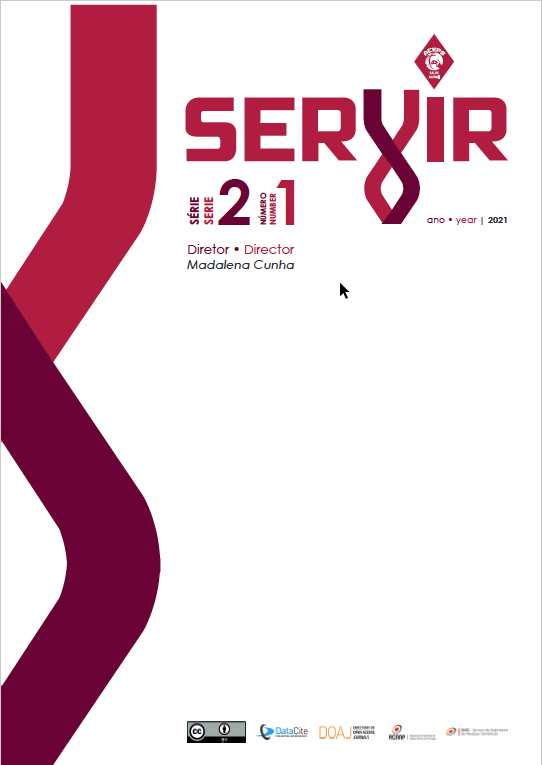Coffee consumption in hypertensive people
systematic review and meta-analysis
DOI:
https://doi.org/10.48492/servir0201.25670Keywords:
coffee, caffeine, hypertension , blood pressureAbstract
Introduction: Hypertension is a major cause of death in the world, it is urgent to intervene in their risk factors for prevention and treatment. The associationbetween coffee intake and hypertension has made health professionals advise against him.
Objective: To evaluate the effect of coffee consumption in systolic and diastolic blood pressure in adults and elderly with hypertension.
Methods: The systematic review of the literature with meta-analysis following the principles proposed by the Cochrane Handbook was performed. The critical analysis, extraction and synthesis ofdata were carried out by two investigators separately and meta-analyses were performed using RevMan 5.3.5.
Results: Three Randomized Clinical Trials (RCT) and twocohort studies covering 264 and 1919 individuals were included respectively. The results of meta-analysis, which included the RCT indicates that the ingestion of coffee with reduced Hydroxyhydroquinone (HHQ) has beneficial effect on systolic blood pressure (MD= -2.60; 95% Cl=-4.81, -0.39; p=0.02) and diastolicblood pressure (MD= -1.30; 95% Cl=-1.67, -0.93; p<0.01). Other studies have shown that the in adult population with hypertension, coffee consumption doesnot interfere with blood pressure. However consumption of more than three cups of coffee a day is associated with the risk of hypertension. In elderlysubjects with hypertension, consumption of more than three cups of coffee increases blood pressure and the possibility of uncontrolled blood pressure.
Conclusion: Consumption of more than three cups of coffee a day is not recommended in people with hypertension. Coffee intake with reduced HHQ is advised.
Downloads
References
Bøhn, S. K., Ward, N. C., Hodgson, J. M., & Croft, K. D. (2012). Effects of tea and coffee on cardiovascular disease risk. Food & Function, 3(6), 575. doi.org/10.1039/c2fo10288a
Bugalho, A. & Carneiro, A. V. (2004). Intervenções para aumentar a adesão terapêutica em patologias crónicas. Centro de Estudos de Medicina Baseada na Evidência. Lisboa: CEMBE. Acedido em http://cembe.org/avc/docs/NOC de Adesão a Patologias Crónicas. CEMBE 2004.pdf
Carneiro, A. V. (2008). O exemplo da avaliação crítica de um ensaio clínico. Jornal Português de Gastrenterologia, 15(2), 30–36
Chikama, A., Yamaguchi, T., Ochiai, R., Kataoka, K., & Tokimitsu, I. (2008). Effects of Hydroxyhydroquinone-reduced Coffee on Blood Pressure in High-normotensives and Mild Hypertensives. Journal Of Health Science, 54(2), 162–173. doi.org/10.1248/jhs.54.162
Higgins, J. P., & Green, S. (2011). Cochrane handbook for systematic reviews of interventions: version 5.1.0. (The Cochrane Collaboration, Ed.). London. Acedido em www.cochrane-handbook.org
Joanna Briggs Institute. (2014). Joanna Briggs Institute Reviewers’ Manual: 2014 edition. Australia: The Joanna Briggs Institute. Acedido em www.joannabriggs.org
Lopez-Garcia, E., Orozco-Arbeláez, E., Leon-Muñoz, L. M., Guallar-Castillon, P., Graciani, A., Banegas, J. R., & Rodríguez- Artalejo, F. (2016). Habitual coffee consumption and 24-h blood pressure control in older adults with hypertension. Clinical Nutrition. doi.org/10.1016/j.clnu.2016.03.021
Mancia, G., Fagard, R., Narkiewicz, K., Redon, J., Zanchetti, A., Böhm, M., … Zannad, F. (2013). 2013 ESH/ESC Guidelines for the management of arterial hypertension. Blood Pressure, 22(4), 193–278. doi.org/10.3109/08037051.2013.812549
Mesas, A. E., Leon-Munoz, L. M., Rodriguez-Artalejo, F., & Lopez-Garcia, E. (2011). The effect of coffee on blood pressure and cardiovascular disease in hypertensive individuals: a systematic review and meta-analysis. American Journal of Clinical Nutrition, 94(4) 1113–1126. doi.org/10.3945/ajcn.111.016667
Ochiai, R., Chikama, A., Kataoka, K., Tokimitsu, I., Maekawa, Y., Ohishi, M., … Mikami, H. (2009). Effects of hydroxyhydroquinone-reduced coffee on vasoreactivity and blood pressure. Hypertension Research, 32(11), 969– 974. doi.org/10.1038/hr.2009.132
Palatini, P., Fania, C., Mos, L., Garavelli, G., Mazzer, A., Cozzio, S., … Casiglia, E. (2016). Coffee consumption and risk of cardiovascular events in hypertensive patients. Results from the HARVEST. International Journal of Cardiology, 212, 131–137. doi.org/10.1016/j.ijcard.2016.03.006
Santos, E. J. F., & Cunha, M. (2013). Interpretação crítica dos resultados estatísticos de uma meta-análise: estratégias metodológicas. Millenium, 44, 85–98. Acedido em hdl.handle.net/10400.19/2273
World Health Organization. (2014). Global status report on noncommunicable diseases 2014. Geneve: WHO. Acedido em http://www.who.int/nmh/publications/ncd-status-report2014/en/
Yamaguchi, T., Chikama, A., Mori, K., Watanabe, T., Shioya, Y., Katsuragi, Y., & Tokimitsu, I. (2008). Hydroxyhydroquinone- free coffee: A double-blind, randomized controlled dose–response study of blood pressure. Nutrition, Metabolism and Cardiovascular Diseases, 18(6), 408–414. doi.org/10.1016/j.numecd.2007.03.004
Downloads
Published
How to Cite
Issue
Section
License
In order to promote the free circulation of knowledge, Servir is open access journal. All its content is available and protected under the Creative Commons license (CC BY 4.0).
The journal allows self-archiving in institutional repositories of all versions, which may become immediately available


